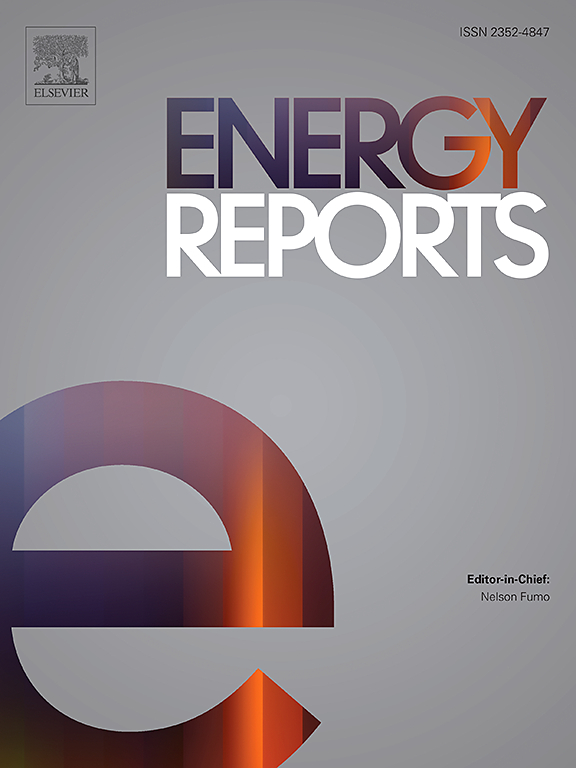虚拟电厂的风险意识投标模型:整合可再生能源预测和碳市场策略
IF 5.1
3区 工程技术
Q2 ENERGY & FUELS
引用次数: 0
摘要
通过虚拟电厂(VPP)框架将可再生能源(RES)整合到能源市场是一种有效的策略,可以减少碳排放,同时提高系统效率、可靠性和成本效益。然而,由于天气变化,基于res的发电本身具有不确定性,因此纳入不确定性模型至关重要。此外,碳排放可以通过碳税和限额与交易计划等碳减排政策作为收入来源。碳减排的另一种方法是提高支付计划,该计划促进了一个更节能的能源市场(EM)。本研究在VPP环境中引入了一种新的投标模型,该模型利用极限梯度增强算法(XGBoost)算法预测RES生成,通过先进的预测技术解决不确定性问题。使用条件风险值(CVaR)方法对相关预测风险进行量化。此外,提出的竞价模式与碳市场相结合,结合各种碳减排政策动态确定碳信用价格。除此之外,本文还使用了一种非常新的元启发式算法White Shark Optimizer (WSO)算法对模型进行了优化,以检验模型收敛的可能性。进行了全面的比较分析,以评估所提出的方法的性能。通过案例研究证明了该模型的有效性,说明了其优化竞标策略的潜力,同时降低了与可再生能源不确定性和碳定价波动相关的风险。通过整合先进的预测方法、风险评估和碳市场机制,这项工作有助于建立一个更加可持续、可靠和经济上可行的能源市场。本文章由计算机程序翻译,如有差异,请以英文原文为准。
A risk-aware bidding model for virtual power plants: Integrating renewable energy forecasting and carbon market strategies
Integrating renewable energy resources (RES) into the energy market through a virtual power plant (VPP) framework is an effective strategy for reducing carbon emissions while enhancing system efficiency, reliability, and cost-effectiveness. However, RES-based power generation is inherently uncertain due to weather variability, making it crucial to incorporate uncertainty modelling. Additionally, carbon emissions can serve as a revenue source through carbon reduction policies such as carbon taxes and cap-and-trade schemes. An alternative approach to carbon reduction is the uplift payment scheme, which promotes a more carbon-efficient energy market (EM). This study introduces a novel bidding model within a VPP environment that leverages Extreme Gradient Boosting algorithm (XGBoost) algorithm to predict RES generation, addressing uncertainty through advanced forecasting techniques. The associated prediction risks are quantified using the Conditional Value at Risk (CVaR) method. Furthermore, the proposed bidding model is integrated with the carbon market, incorporating various carbon reduction policies to determine carbon credit prices dynamically. In addition to this, the proposed model is also optimized with a very new meta-heuristic algorithm called White Shark Optimizer (WSO) Algorithm to check the possibility of convergence of the model. A comprehensive comparative analysis is conducted to evaluate the performance of the proposed approach. The model’s effectiveness is demonstrated through case studies, illustrating its potential to optimize bidding strategies while mitigating risks associated with RES uncertainty and carbon pricing fluctuations. By integrating advanced forecasting methods, risk assessment, and carbon market mechanisms, this work contributes to the development of a more sustainable, reliable, and economically viable energy market.
求助全文
通过发布文献求助,成功后即可免费获取论文全文。
去求助
来源期刊

Energy Reports
Energy-General Energy
CiteScore
8.20
自引率
13.50%
发文量
2608
审稿时长
38 days
期刊介绍:
Energy Reports is a new online multidisciplinary open access journal which focuses on publishing new research in the area of Energy with a rapid review and publication time. Energy Reports will be open to direct submissions and also to submissions from other Elsevier Energy journals, whose Editors have determined that Energy Reports would be a better fit.
 求助内容:
求助内容: 应助结果提醒方式:
应助结果提醒方式:


